TVA in Mississippi
Mississippi River Basin
|
NEW ESRI StoryMaps: What's On Our Shelves & NWNL Song Library & No Water No Life ESRI |
Mississippi River Basin
Morgan Turner
Recent college graduate and Iuka resident
Alison M. Jones
NWNL Executive Director
Holcut – A Farming Town, Gone…
Families Who Left Holcut
Memorial Pavillion
Community Impacts of The Waterway
Morgan’s Views
Morgan’s Future
Trains
Sulpher Springs
All images © Alison M. Jones. All rights reserved.
While following the Tennessee River for NWNL as a major eastern tributary of the Mississippi River, I met Morgan in my search for a cup of coffee. Finding Iuka’s Apron Museum first, I got directions to the local cafe. I found that Morgan, a recent college graduate, represented both the past and the future of Iuka and the resilience of families ousted from their homes for the sake of building a new canal and waterway. The idea of a waterway from the southern end of the Tennessee River to the Gulf of Mexico was first proposed in Colonial times. In the 1940’s, FDR considered it as a way to provide employment during the Depression. Finally, President Nixon committed $1 million in the 1960’s, allowing this canal to be built as a transportation alternative to rail. In 1988, during a river-lowering drought, this canal served as an alternative for the Lower Mississippi River barge traffic.
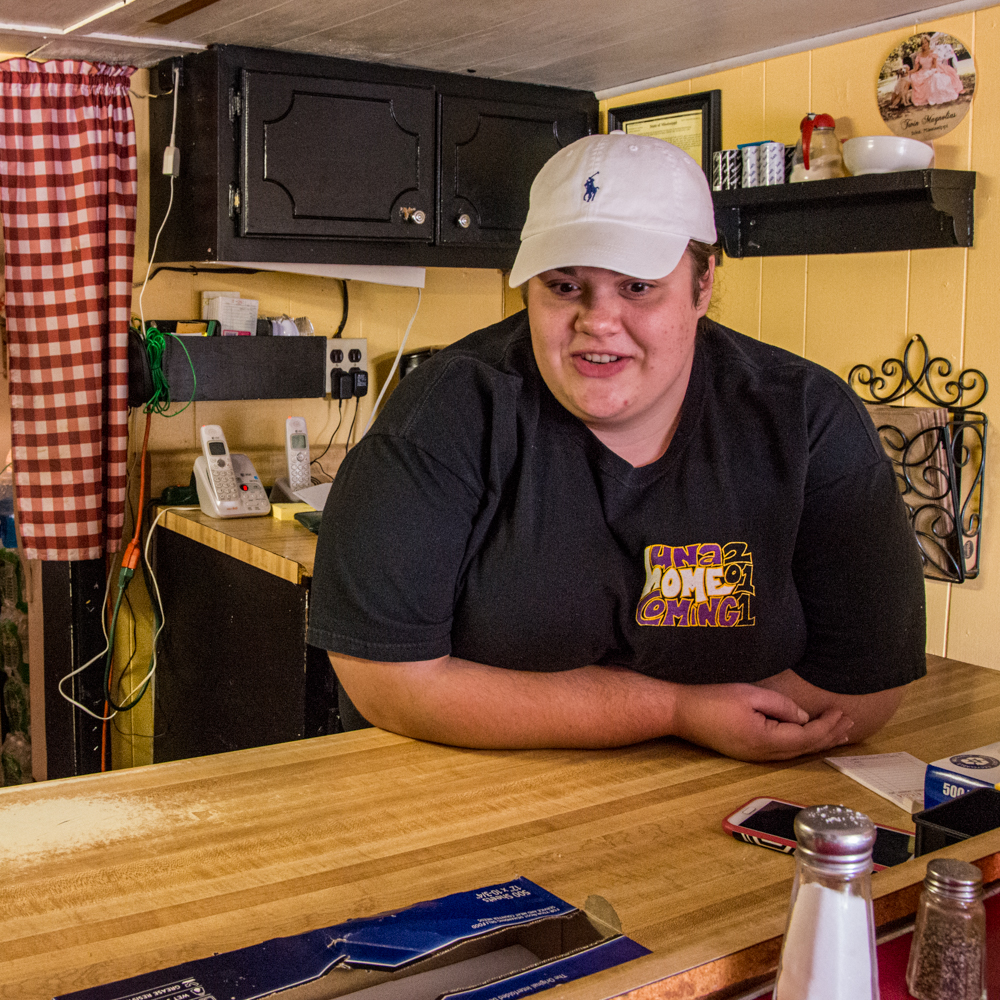
NWNL Morgan, as I sit here on a stool, awaiting a coffee and my first slug burger, will you please describe this town, settled before the Civil War as a stage coach stop – that time seems to have forgotten? So far, all I know is there is an Apron Museum here!
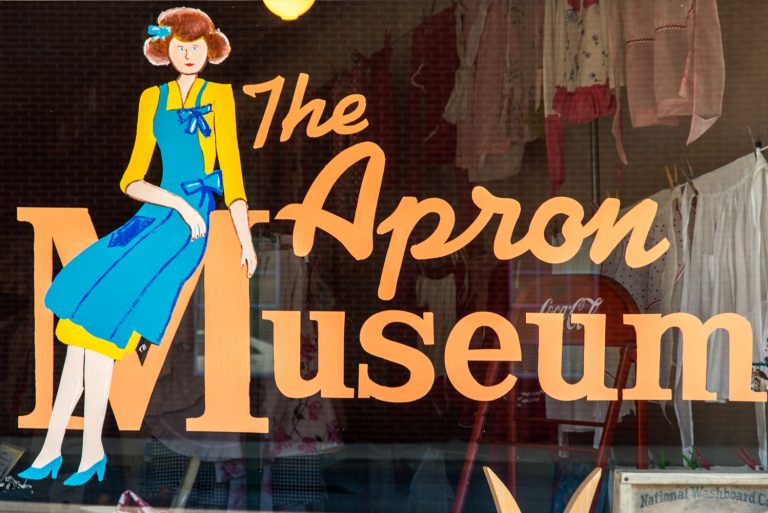
MORGAN TURNER This is Iuka, Mississippi, adjacent to Tennessee and Alabama and formerly called Eastport MS. We are at Iuka’s Front Street Snack Bar, where I serve slug burgers, a long-time staple here in the northeast corner of Mississippi. And because I know you’ll ask, a “slug burger” is made up of skim milk mix and pork meat. It was sold back in the Depression [sometimes mixed with soy meal if there wasn’t enough pork available], and it has mustard, pickle, onion. Always has. The reason it was once called a slug burger is because it used to cost a nickel; and we used to call a nickel a “slug.”
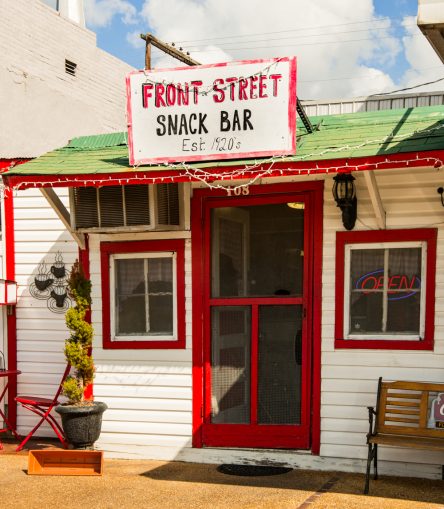
NWNL While you are grilling my slug burger, I’d like to discuss the building of the 29-mile “Divide Cut” connection forming the Tennessee-Tombigbee Waterway (aka, “The Waterway”) and how that affected your family. I understand The Waterway and its canal, finished in 1984, serves as a barge shortcut by linking the Tennessee River via the Tombigbee River to access to the Gulf of Mexico.
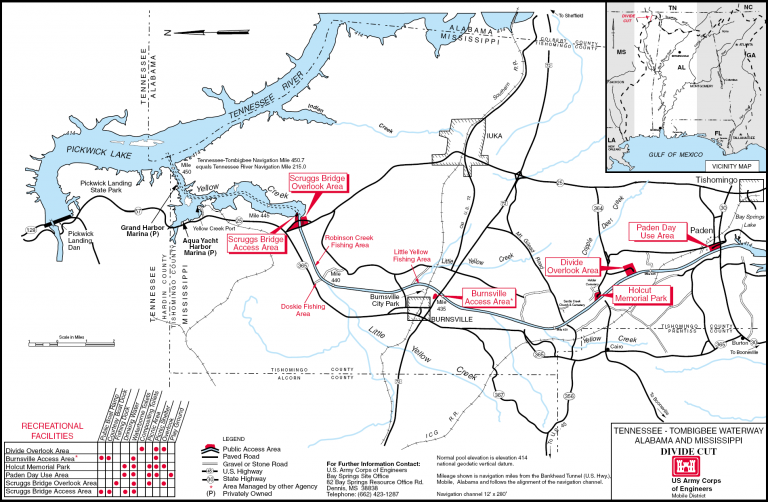
MORGAN TURNER Before the Tennessee-Tombigbee Waterway came through, my great, great grandfather owned two or three hundred acres out there, with a bunch of people sharecropping. He lost all of that. With everything his family had worked for, they lost everything – just so The Waterway could come through. I think my Holcut great-grandmother was sixteen or seventeen when they all had to move. The TVA only gave her mother, her dad and their 19 kids about a month or two to pack up and go. The family had to try to find some kind of land somewhere else so they could build a new house.
My granny was one of the older children and the oldest. The rest of them were just really tiny. My grandfather was 24 and not out of the house yet. But they gave my grandfather a job and paid him for his house and his land, where he and two or three other men had a cotton farm. The job they gave him was digging the Waterway.
NWNL How many other people there also had to move also?
MORGAN TURNER There were about six houses near my family’s home. Granny said their neighbors each had about 10 or 12 kids a piece. So, there was a bunch of people that had to move. That was where most of our farmers lived because it was just such good soil out there.
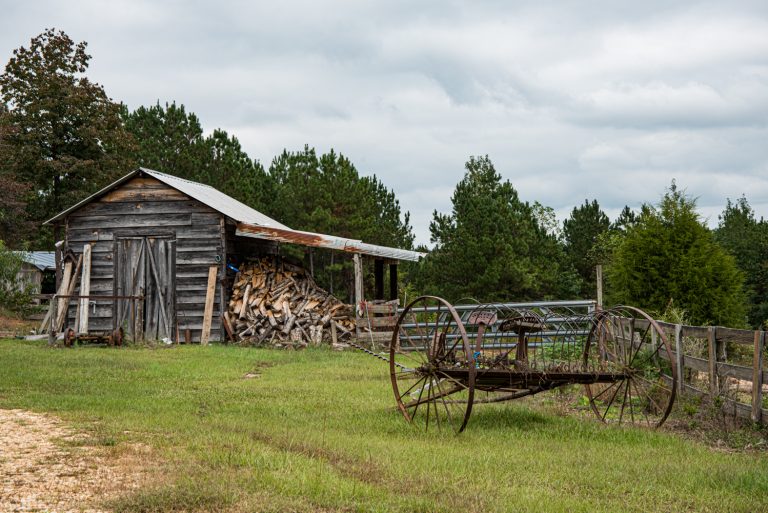
NWNL How did your granny and grandfather feel about it?
MORGAN TURNER Well, my granny never really said. She hated to leave her house that she had grown up in and where she saw her brothers and sisters be born. They were happy that the TVA gave them that job, but they were also sad because farming’s really the only thing they ever did. They went to school; and they graduated; but they just farmed – that’s it.
NWNL Where did they move to from Holcut? What was their life like once they moved? Did your great grandfather find a new job?
MORGAN TURNER They moved to Midway, Mississippi, wherever that is…. It’s somewhere in Tishomingo County. It was way far out there, back then especially. Way far out there. But my great-granny’s mother had land out there and so they just moved in beside them. My granny’s mother hated it. She hated that waterway because she had to leave; and because all they did was farm. After that, when the kids grew up, they moved away.
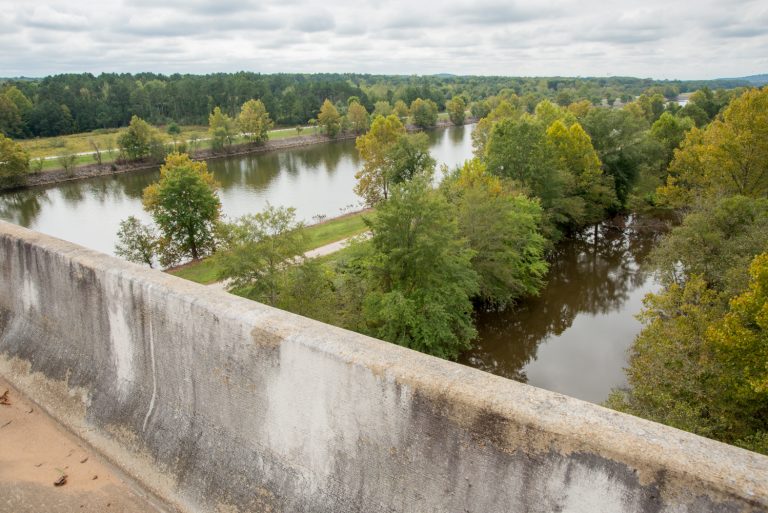
NWNL So, Holcut’s community didn’t move together to one other place?
MORGAN TURNER Of course, those in Holcut were all friends. They had a little church out there; but when they moved, they didn’t see anybody except when they would go to town. One of the families they knew was reluctant to give up their land, so that father didn’t get a job with the waterway. They had to move up to Chicago where his wife’s family was originally from. They didn’t have any money and he didn’t have a job. Farming was all they knew. That was it.
Granny didn’t see a whole lot of people; and they never really farmed anymore. Her mom was a seamstress and stuff for people, and she was a nanny. She kept kids. They all had to get jobs after leaving Holcut, where farming had been their main breadwinner. When they got paid by The Waterway, it wasn’t as good as what they made with farming. They all had to get jobs, because they couldn’t afford to build a house as big as they had before without that farming money coming in.
My granny got married when she was 18, I do believe. Granny’s husband’s family was displaced also, although they lived on the other side, way far down the road. The rest of the kids moved out.
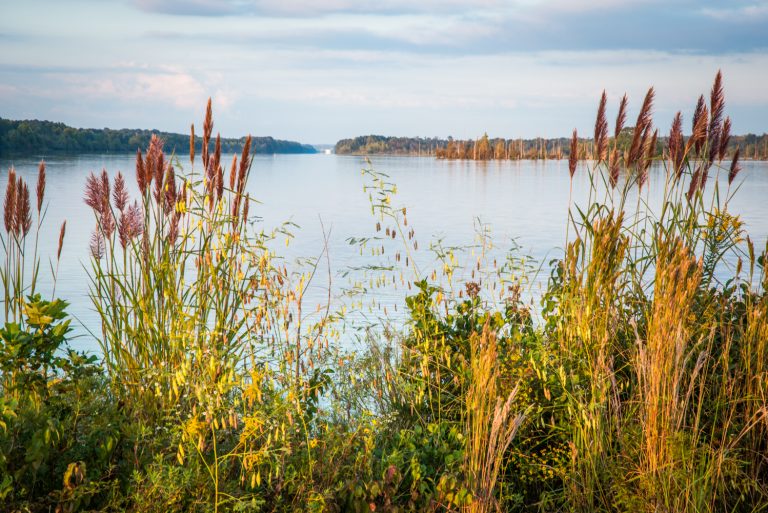
Of my granny’s friends, one moved to Chicago and they kept in contact. Her mom got depressed because she didn’t know a lot of people. Her dad killed himself over it, because he couldn’t find work.
Granny and her friends reconnected and talk on the phone all the time. It’s neat. She lives in Skokie, Illinois, and her kids and grandkids brought her down here for my Granny’s 90th birthday. We took them to go see Holcut. Before the construction, her house would have been probably about half a mile from my granny’s house. My granny lived right back where the pavilion is. The pavilion took out the front part of her house.
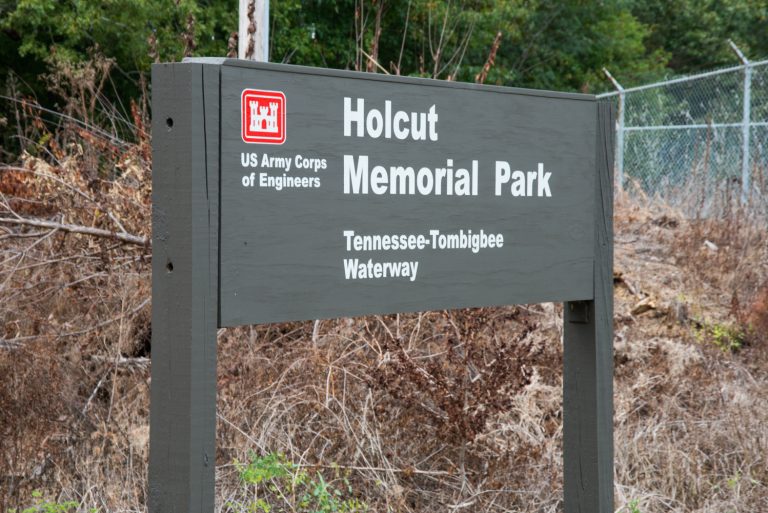
NWNL Could you describe the Holcut Pavilion? I saw the sign, but the current federal government shut down prevented me from seeing the Pavillion itself.
MORGAN TURNER Holcut’s Memorial Pavilion is right off on the eastside of the Waterway. It’s a little picnic area with a grill. Many churches around here have Easter sunrise services there on the water, because it’s so pretty.
NWNL I’ve read it took a while for TVA to create this Memorial Pavilion.
MORGAN TURNER The TVA wasn’t going to put anything up until people started petitioning and actually showed how many people’s homes and lands were lost. And so, they put up a pavilion – not a big thing. I think there are some bathrooms out there, a pavilion, a grill and a little bitty plaque. “This memorial salutes Holcut for the greatness [of the community] displayed in sacrificing for the future.” That’s about it. There are some trails; but it’s mainly just a little overlook managed by the Corps of Engineers. I don’t know.
NWNL Are you, yourself, happy with the pavilion as a memorial of the past?
MORGAN TURNER I think they could put a wall up with people’s pictures. Everybody’s got pictures. I have pictures of my great-grandmother standing out there, and of my great-great-grandfather helping to cut the waterway.
NWNL How did people outside your family feel about the waterway?
MORGAN TURNER Most of the people didn’t want to leave, like my granny who said she cried and cried over leaving her home. It was the end of all that people had worked for. Yet, some people around Granny’s community saw the money, and so they were happy because we got the railroad. I think they saw The Waterway as another job opportunity and more money with barges coming through. A lot of people were pushing towards the Industrial Age back then, and they felt we needed to do this. But they weren’t thinking about the people that lived out there, and who had their roots out there.
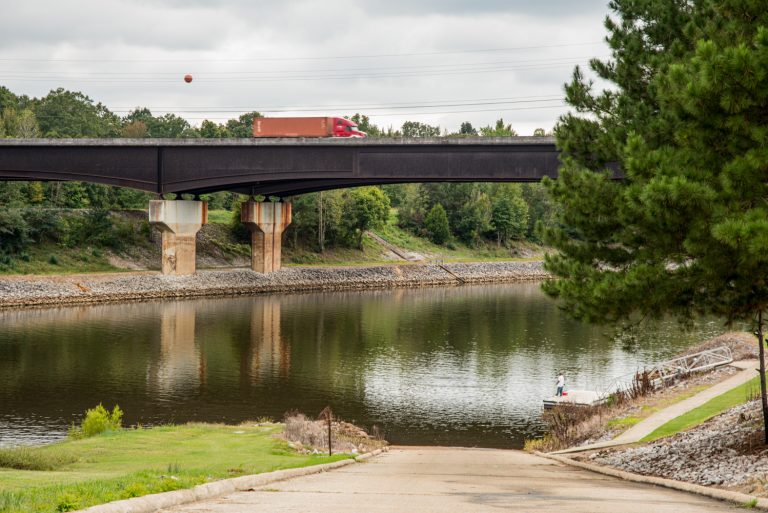
NWNL How do people think about it now, today? How do you feel?
MORGAN TURNER We don’t really think about it. I can count on my hand how many times I went to Holcut. The Waterway is just one of those things that happened, and it was way before my time. My granny still remembers it, but it’s a done deal even for her. She doesn’t really care anymore.
NWNL Has this waterway brought any industry to Iuka and neighboring towns?
MORGAN TURNER No. No, it hasn’t. The Waterway is only about allowing barges to go up and through. We can go to The Waterway on the Fourth of July weekend and in the summertime to launch our boat and have fun. But that’s about it. It doesn’t bring jobs or income. It’s just a waterway. That’s it.
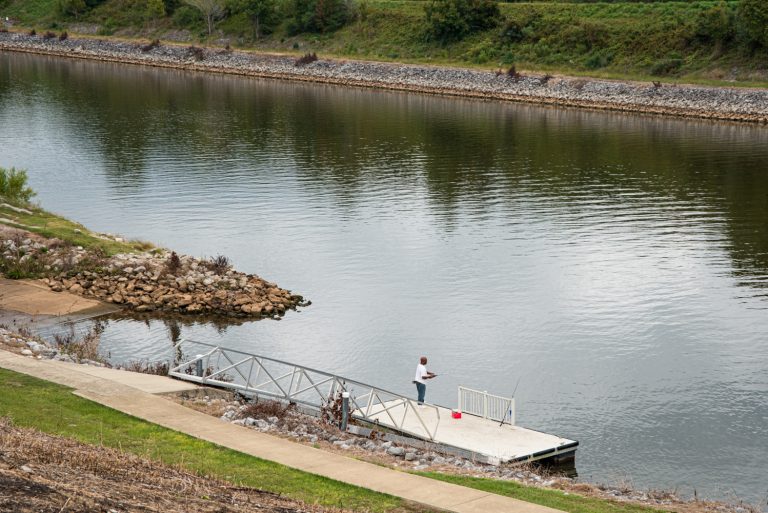
NWNL What did you study in college; and what do you plan to do from here on?
MORGAN TURNER Since graduating from University of North Alabama with a Bachelors’ Degree in Chemical Engineering, I’ve seen both sides of the spectrum. I’m going to work for TVA in another year. I can see issues about TVA from an electricity standpoint, and I can also see issues about the TVA from other peoples’ side.
I’m kind of glad the TVA came through because I have a job now. But I never really saw the necessity of their cutting through a whole community when they built the Tennessee-Tombigbee Waterway. I don’t see why they couldn’t have cut around it, or put it at a different location. They could have put it through where nobody was living — instead of uprooting people who were pregnant, or had all these kids, or had farmland… just to put a big ditch through it. I just don’t see that point.
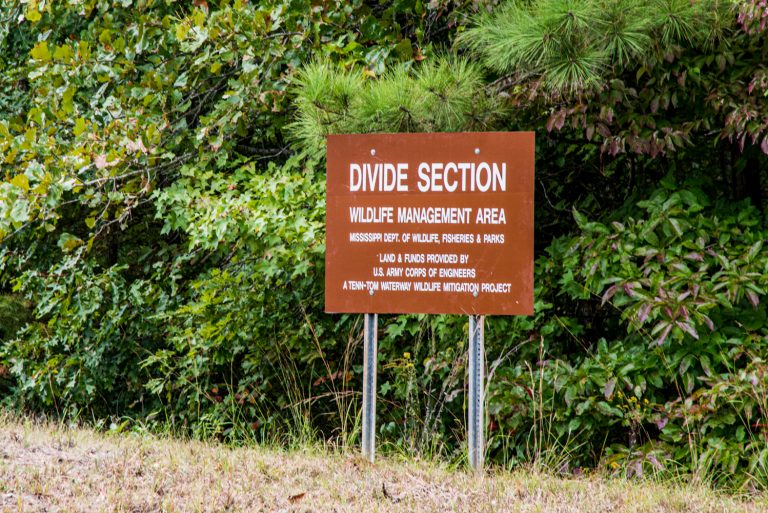
NWNL Has TVA ever addressed your question as to why they went through Holcut rather than go around? Perhaps it an expense issue?
MORGAN TURNER I believe it was just for money. It was just more convenient, and they believed they could buy these people off. They knew those in Holcut were kind of poor and just relied on their farms. TVA knew it could offer a hunk of change that those farmers hadn’t seen before and they would sell their land, so that’s what they did. They didn’t think about the long-term aspect. Of course, if one person objected, it wouldn’t really have mattered. They’d have taken the land anyway. So, it’s really not fair. It was just more convenient to go straight through instead of just creating a little loop around where these people were so they could still live there.
NWNL Yesterday, as I followed The Waterway down to Amory, I wondered how much TVA’s decision was based on geology. Was Holcut in a depression, or a valley, thus making it a more feasible route?
MORGAN TURNER It’s kind of a little valley that had a little community. We’re in the foothills of the Appalachian Mountains and so there are hills. It’s a little dip now, but back then it was big because you had farms and houses, although they didn’t have a town or even a general store out there. They had to come into Iuka.
Maybe TVA thought they were doing these people a favor; since forcing them to move here would mean they wouldn’t have to go so far. They would be closer to everything and could find jobs in the town. My grandpa did and my great grandpa was a blacksmith here. His little blacksmith shop is in that picture on the wall there. So yeah. I guess a lot of people just evolved with having to move. They had to. They didn’t have any other choice.
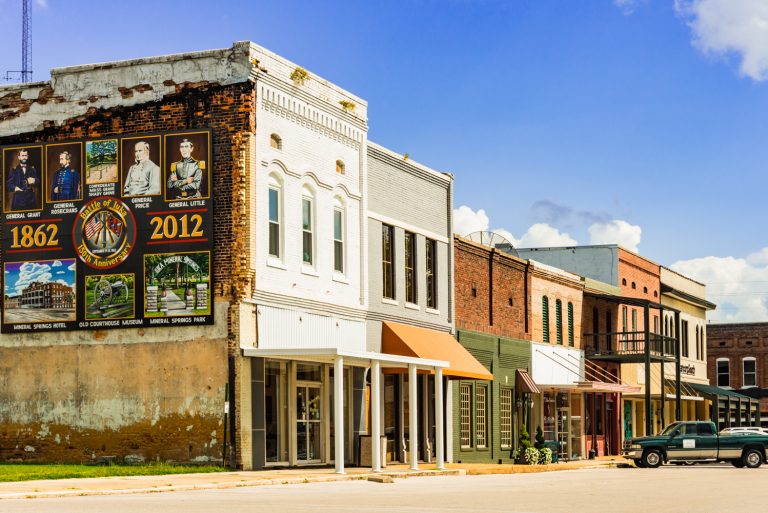
NWNL What will you be doing for TVA?
MORGAN TURNER I’ll be the chemical engineer, testing water quality and making sure that the water’s safe to drink and safe to use. I’ll be working on another few little things, like the tiger mussels that clog up the dam. They’re trying to find something that’ll kill them that won’t harm the water because they’re such a big problem. It’s expensive for divers to go in and try to get them off.
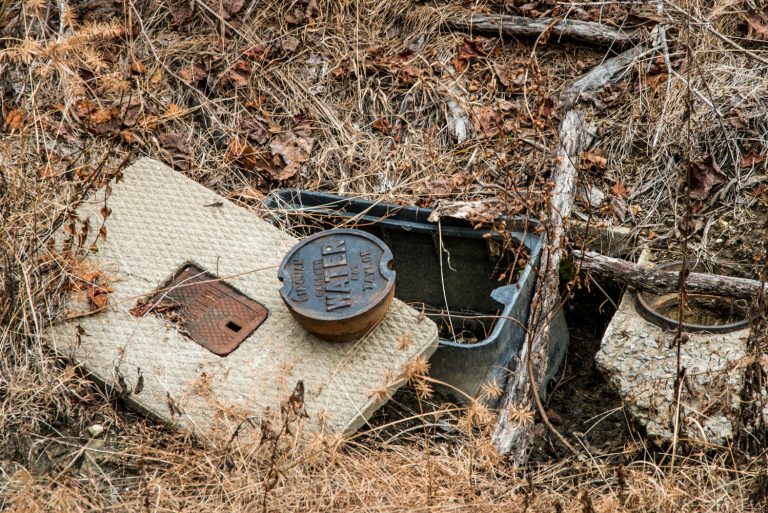
NWNL What will you be doing for TVA?
MORGAN TURNER I’ll be the chemical engineer, testing water quality and making sure that the water’s safe to drink and safe to use. I’ll be working on another few little things, like the tiger mussels that clog up the dam. They’re trying to find something that’ll kill them that won’t harm the water because they’re such a big problem. It’s expensive for divers to go in and try to get them off.
NWNL Are these invasive mussels from somewhere else? Where do they come from?
MORGAN TURNER I think one of my biology professors there said they’re from China. They were brought in and took over. They’re very small.
NWNL Are there also native mussels in these waters?
MORGAN TURNER I think so. My uncle used to dive for them, maybe to sell them. I don’t know if there are as many as there were back then. I heard some areas have been fished out, which is kind of sad. But I don’t scuba dive, so I don’t know.
NWNL Is what I hear the sixth train going through this morning?
MORGAN TURNER Yes, that’s the sixth one – on the cargo track. We should have about ten more, from now until about 3 o’clock in the morning.
NWNL Is most of shipping in this region done by train or barges?
MORGAN TURNER The port of Florence in Alabama is about 35 or 40 minutes from here. Most that comes through here unloads there and in Memphis. The trains come through here, but they don’t stop here in Iuka anymore.
There used to be a little post over there, where they’d hang mail. The train man would throw out a bag of mail; pick up the hanging bag; and go. There’s a passenger train that used to stop over. What’s now Pizza Hut was the last train station left where you could get on or off the train. Buses also used to come through; and this used to be a taxi stand.
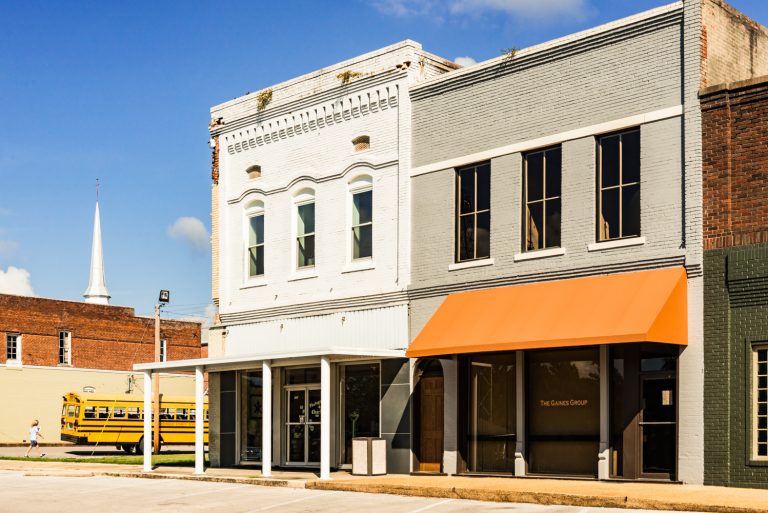
NWNL Iuka sounds like it was a busy place.
MORGAN TURNER Iuka used to be booming; back when the railroad was coming through, and everything was just going great. Now it’s just kind of like it’s here in the cafe. McDonalds came with the four-lane road that came through. But who wants to eat McDonalds? Their food doesn’t really decompose very well. My professor at school had a glass, airtight container with a McDonald’s cheeseburger sitting in it that he said had been in it for five years.
NWNL Speaking about quality, what’s the quality of your water here in Iuka?
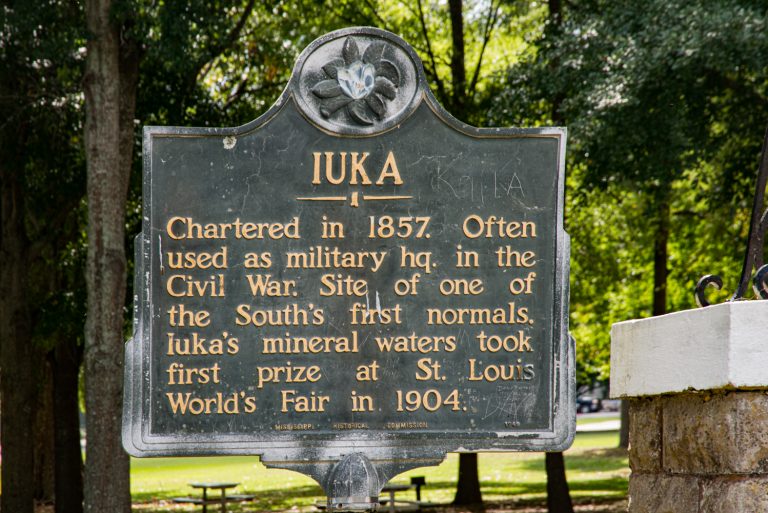
MORGAN TURNER Oh, it’s good. People used to come here for our mineral springs and drink the water because they thought it had healing powers. It really just had sulfur in it. But there used to be people camped out all the time in the park just to get that water. Some people would bottle it.
NWNL I noticed your Mineral Springs Hotel.
MORGAN TURNER Oh yeah, this was a big destination for water. People would come from, oh gosh, miles. Iuka’s water won the World Fair in like 1903 in St. Louis. People came from New York, Chicago and everywhere just to get the water. They carried jugs and bottles back with them. Think of sulfur drugs. People thought this water would help them a lot.
You can still go fill up a bottle up at the park from the four springs there. They have little hutches over them and still run. And you can go fill your bottle and drink it. That’s why, even when kids go play at the park here, nobody ever takes anything to drink, because they can get water out of the springs.
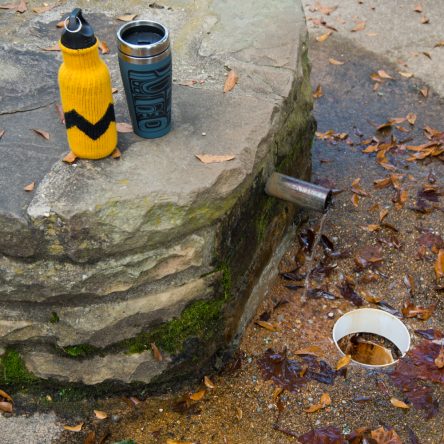
NWNL What does that water taste like?
MORGAN TURNER It’s really good; it’s really clear; and it’s really cold – especially if you have a headache, because of all the minerals and stuff in it. The Indians really believed in it.
NWNL What happened to the Indians here? I read that the Tombigbee River’s name comes from the Choctaw language, meaning “coffin-maker;” and that that river marked their eastern boundary.
MORGAN TURNER My great-grandmother’s mother was a full-blooded Indian, and thus our great grandmother is half-Indian. Today most of them are gone. About four still live here, but most of the rest are down in Philadelphia, Mississippi, where they have the Indian Reservation and own most of the casinos. They’ve done well for themselves.
NWNL Morgan thank you for sharing your family’s stories. And, having finished my slug burger, I understand you also have an unusual desert?
MORGAN TURNER Yes! We have “pickle sickles” for 25 cents. They served those forever. Those are made with just water, pickles and juice. Or you can have a Twinkie.
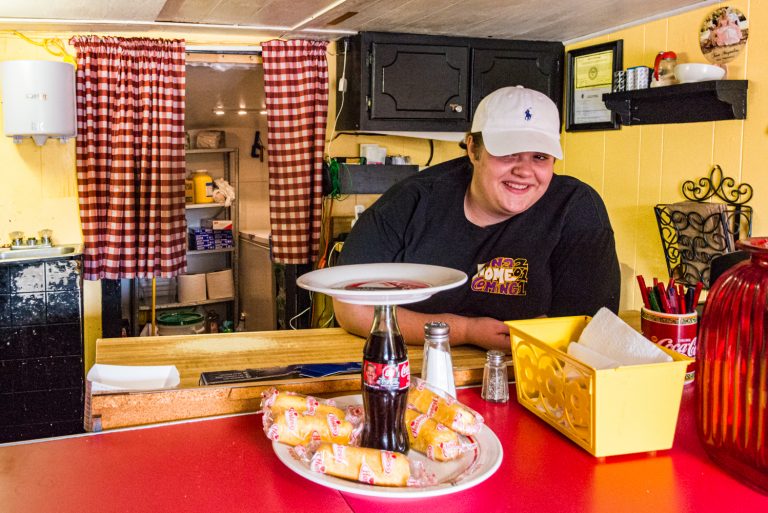
NWNL Didn’t they stop making Twinkies?
MORGAN TURNER They’ve started to come back. I think Sunbeam bought them out.
NWNL Well, I hope Sunbeam never buys out Iuka’s slug burgers! Thank you again, and good luck with your career!
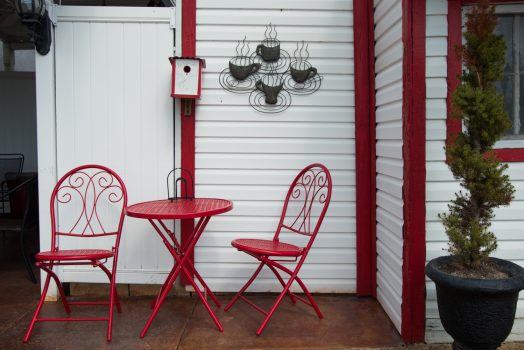
Posted by NWNL on August 4, 2021
Transcription edited and condensed for clarity by Alison M. Jones.
All images © Alison M. Jones. All rights reserved.
